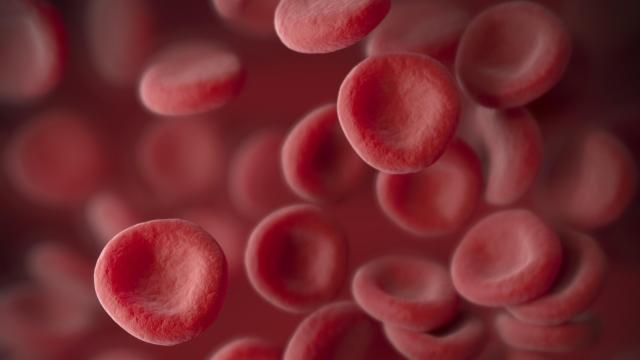An important clinical trial is now underway in the UK. The study is the first to transfuse red blood cells grown in the lab from donated stem cells into humans. Should this research pay off, these blood cells would be incredibly valuable for people with rare blood types, though they wouldn’t replace the need for traditional blood donation.
The RESTORE trial, as it’s known, is being conducted by scientists from the UK’s National Health Services and various universities. At least 10 healthy volunteers are expected to be enrolled in the study. All of them will receive two mini-transfusions, spaced four months apart and in random order, of the lab-grown blood cells and standard cells, both of which are derived from the same donor. As of early Monday, two participants have already gotten the lab-grown blood cells and so far appear to have experienced no side-effects.
The first-of-its-kind experiment is a Phase I trial, meaning that it’s primarily designed to test the safety of a novel or experimental treatment. But the lab-grown cells are theoretically fresher than the mix of newer and older blood cells taken from a typical blood donation (on average, red blood cells live for about 120 days). So the researchers are hoping that the lab-grown cells survive longer than the standard cells in their recipients.
“If our trial, the first such in the world, is successful, it will mean that patients who currently require regular long-term blood transfusions will need fewer transfusions in [the] future, helping transform their care,” said chief researcher Cedric Ghevaert, a hematologist and a professor in transfusion medicine at the University of Cambridge, in a statement released by the NHS.
Scientists have long been interested in manufacturing blood in the lab. But it’s proven to be challenging to replicate the complex natural process that allows stem cells in our blood marrow to become new red blood cells. The RESTORE researchers believe that they’ve found a more effective way to extract stem cells from donated blood, to grow these cells using a unique blend of nutrients, and to purify enough healthy and mature red blood cells from the resulting concoction to be worth the effort.
Should this project turn out to be a success, lab grown blood cells still won’t replace the donated supply anytime soon. The team’s process is much less efficient than what the human body can do. Currently, for instance, they need about 24 litres of their nutrient solution to filter out one to two tablespoons of red blood cells. Meanwhile, about 45% of our blood is composed of red blood cells.
Even if mass-produced lab-grown blood cells are a far off possibility, they may still be able to help many people in the near future. This technology could one day provide a more reliable and longer-lasting supply of blood cells to people who have a rare mix of blood types or who have developed conditions that make it difficult to receive standard transfusions, such as sickle cell disease.
For now, this trial is only the start. It will require more studies in humans and anywhere from five to 10 years of development before we could expect to see lab-grown blood cells available to the public, the researchers say.
